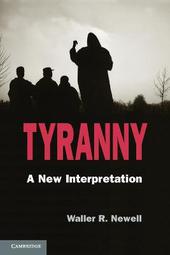
|
Tyranny: A New Interpretation
Paperback / softback
Main Details
| Title |
Tyranny: A New Interpretation
|
| Authors and Contributors |
By (author) Waller R. Newell
|
| Physical Properties |
| Format:Paperback / softback | | Pages:552 | | Dimensions(mm): Height 227,Width 157 |
|
| Category/Genre | Social and political philosophy |
|---|
| ISBN/Barcode |
9781107610736
|
| Classifications | Dewey:321.9 |
|---|
| Audience | | Professional & Vocational | | General | |
|---|
| Illustrations |
Worked examples or Exercises
|
|
Publishing Details |
| Publisher |
Cambridge University Press
|
| Imprint |
Cambridge University Press
|
| Publication Date |
27 May 2013 |
| Publication Country |
United Kingdom
|
Description
This is the first comprehensive exploration of ancient and modern tyranny in the history of political thought. Waller R. Newell argues that modern tyranny and statecraft differ fundamentally from the classical understanding. Newell demonstrates a historical shift in emphasis from the classical thinkers' stress on the virtuous character of rulers and the need for civic education to the modern emphasis on impersonal institutions and cold-blooded political method. By diagnosing the varieties of tyranny from erotic voluptuaries like Nero, the steely determination of reforming conquerors like Alexander the Great and Julius Caesar and modernizing despots such as Napoleon and Ataturk to the collectivist revolutions of the Jacobins, Bolsheviks, Nazis and Khmer Rouge, Newell shows how tyranny is every bit as dangerous to free democratic societies today as it was in the past.
Author Biography
Waller R. Newell is Professor of Political Science and Philosophy at Carleton University. He is the author of The Soul of a Leader: Character, Conviction, and Ten Lessons in Political Greatness (2009), The Code of Man: Love, Courage, Pride, Family, Country (2003) and Ruling Passion: The Erotics of Statecraft in Platonic Political Philosophy (2000).
Reviews'Learned, searching essays directed toward the recovery of the notion of tyranny from Machiavelli's almost successful attempt to suppress it. Anyone who wants to understand modern politics will profit from Waller Newell's eye-opening analysis.' Harvey Mansfield, Harvard University, Massachusetts and Hoover Institution, Stanford University, California 'In this extraordinary new book, Waller Newell offers the first systematic account of the difference between ancient and modern tyranny. The author argues that modern tyrannies are the products of modern philosophy. To understand tyranny aright we must view it as part of the revolutionary effort of modern philosophers to provide the tools for the conquest of nature, including human nature ... This book should prove an instant classic taking its place alongside other seminal studies of modern totalitarianism by the likes of Hannah Arendt and Raymond Aron.' Steven B. Smith, Alfred Cowles Professor of Political Science, Yale University, Connecticut '[A] powerful challenge to recent, more democratic, and ethical readings of Machiavelli. Ancient and modern understandings of tyranny are fundamentally different, Newell argues, because they rest on different understandings of nature - both cosmic and human. Whereas the classical view of tyranny to be found in the works of Plato, Aristotle, and Xenophon is essentially erotic, the modern view originated by Machiavelli consists in a will to master and transform human beings as well as the world in which we live.' Catherine H. Zuckert, University of Notre Dame, Indiana and editor of Political Philosophy in the Twentieth Century (2011) 'A distinguished scholar of the history of political philosophy elaborates a study of [tyranny] ... that dark but recurring phenomenon. By focusing on Machiavelli as the hinge of fate in the theory and meaning of tyranny, Newell reveals the historical dynamic that has brought into being the peculiar combination of the demonic and the prosaic that characterizes tyranny in our late modern epoch.' Thomas L. Pangle, University of Texas, Austin 'A masterful account of the fatal evolution of tyranny from ancient to modern and from charm to terror ... offers insightful analyses of political thought from Plato to Hobbes and beyond.' Barry Strauss, Cornell University, New York 'This is the life-work of a great scholar; I recommend it heartily to all readers who wish to understand how tyranny has been reinvented in modern times, made more lethal and in certain respects more difficult to recognize than it was before the philosophic and scientific revolution that began around 1600 and has accelerated with every decade, as Henry Adams anticipated it would. Newell not only has a beautiful mind; he writes very clearly in a public-spirited effort to reach a wide audience of concerned citizens.' Robert Eden, Hillsdale College, Michigan 'Newell materfully explores the phenomenon of modern tyranny, and contemporary confusion about it, with an extensive historical, philosophical, and psychological examination of older views of tyranny that were abandoned in the early-modern West. ... This engaging and comprehensive study of tyranny also serves as a provocative and sometimes original history of political thought through the epochs of classical antiquity, Christianity, and modernity.' Choice '... this is an important and rich book, full of original interpretations and insights.' Giovanni Giorgini, The Review of Politics '... extremely illuminating ... what Newell's book shows is the stark reality that far from being a purely exceptional phenomenon, tyranny has in fact haunted the project of modernity from the beginning.' Matthew Ellison, Cambridge Humanities Review 'Waller R. Newell's book Tyranny: A New Interpretation has everything a book can offer to a serious reader of political philosophy ... Newell has not only integrated and thoroughly applied the intellectual intentions of great thinkers like Strauss or Voegelin, but he has tried to challenge them in a moderate and decent way.' Andras Lanczi, VoegelinView
|